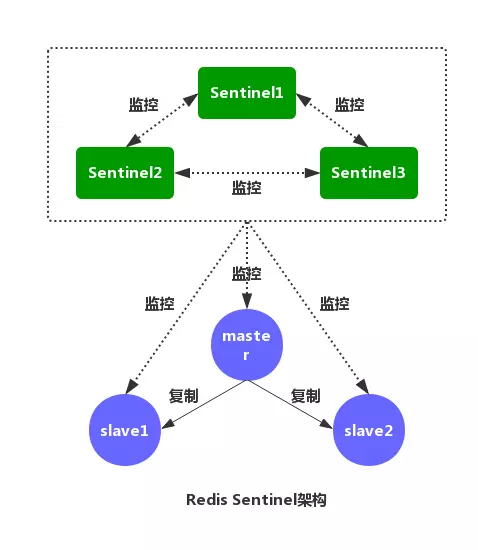Main functions of Redis Sentinel
Sentinel's main functions include primary node survival detection, master-slave operation detection, automatic failover, master-slave switching. The minimum configuration of entinel in Redis is one master and one slave.
The entinel system of Redis can be used to manage multiple Redis servers. The system can perform the following four tasks:
Monitor
Sentinel constantly checks whether the master and slave servers are functioning properly.
notice
Sentinel sends notifications to administrators or other applications through API scripts when a Redis server under monitoring has problems.
Automatic failover
When the master node does not work properly, Sentinel will start an automatic fault transfer operation. It will upgrade one of the slave nodes in which the failed master node is a master-slave relationship to a new master node, and point other slave nodes to the new master node.
Configuration Provider
In Redis Sentinel mode, when the client application is initialized, it connects to the Sentinel node set, from which the information of the primary node is obtained.
Subjective and objective offline
By default, each Sentinel node sends PING commands to Redis nodes and other entinel nodes at a frequency of once a second, and determines whether the node is online by the reply of the node.
Subjective Offline
Subjective offline is applicable to all master and slave nodes. If Sentinel does not receive a valid response from the target node within milliseconds of down-after-milliseconds, it will determine that the node is subjectively offline.
Objective Offline
The objective offline is only applicable to the primary node. If the primary node fails, the Sentinel node will ask other Sentinel nodes for their status judgement by sentinel is-master-down-by-addr command. If the number of nodes exceeding < quorum > determines that the primary node is not reachable, the Sentinel node will judge that the primary node is objective downline.
The schematic diagram is as follows

master, slave configuration file content
cat 6380/redis-6380.conf port 6380 logfile "./redis-6380" #Daemon process model daemonize yes cat 6381/redis-6381.conf port 6381 logfile "./redis-6381" daemonize yes replicaof 127.0.0.1 6380
sentinel configuration file content
cat 26379/redis-sentinel.conf port 26379 # Daemon process model daemonize yes pidfile /var/run/redis-sentinel.pid logfile /var/log/redis/sentinel.log dir /tmp # Sentinel monitors the master, marking master as odown after at least quorum sentry instances think master down # (objective down objectively; corresponding to the existence of sdown, subjective down, subjective down) state. # Slves are automatically discovered, so you don't need to specify them explicitly. sentinel monitor mymaster 127.0.0.1 6379 2 # How long does master or slave last (default 30 seconds) and cannot be marked as s_down. sentinel down-after-milliseconds mymaster 30000 sentinel parallel-syncs mymaster 1 # If sentinel failover operation is not completed within this configuration value (i.e. master/slave automatic switching in case of failure), it is considered that this failover failed. sentinel failover-timeout mymaster 180000 sentinel deny-scripts-reconfig yes cat 26380/redis-sentinel.conf port 26380 daemonize yes pidfile /var/run/redis-sentinel.pid logfile /var/log/redis/sentinel.log dir /tmp sentinel monitor mymaster 127.0.0.1 6380 2 sentinel down-after-milliseconds mymaster 30000 sentinel parallel-syncs mymaster 1 sentinel failover-timeout mymaster 180000 sentinel deny-scripts-reconfig yes cat 26381/redis-sentinel.conf port 26381 daemonize yes pidfile /var/run/redis-sentinel.pid logfile /var/log/redis/sentinel.log dir /tmp sentinel monitor mymaster 127.0.0.1 6380 2 sentinel down-after-milliseconds mymaster 30000 sentinel parallel-syncs mymaster 1 sentinel failover-timeout mymaster 180000 sentinel deny-scripts-reconfig yes
Start up services
redis-server 6380/redis-6380.conf redis-server 6381/redis-6381.conf redis-server 26379/redis-sentinel.conf --sentinel redis-server 26380/redis-sentinel.conf --sentinel redis-server 26381/redis-sentinel.conf --sentinel #The configuration file will be modified after startup
Verify cluster status
#Connect to sentinel node redis-cli -h 127.0.0.1 -p 26381 #Query primary node status 127.0.0.1:26381> SENTINEL get-master-addr-by-name mymaster 1) "127.0.0.1" 2) "6380" #Query Sentinel Status 127.0.0.1:26381> info sentinel # Sentinel sentinel_masters:1 sentinel_tilt:0 sentinel_running_scripts:0 sentinel_scripts_queue_length:0 sentinel_simulate_failure_flags:0 master0:name=mymaster,status=ok,address=127.0.0.1:6380,slaves=1,sentinels=3 #Simulate the failure to shut down the master node process #Query again 127.0.0.1:26381> SENTINEL get-master-addr-by-name mymaster 1) "127.0.0.1" 2) "6381" #Successful handover #Verification success
Reference material
https://www.cnblogs.com/bingshu/p/9776610.html Blog
https://redis.io/topics/sentinel Official website information